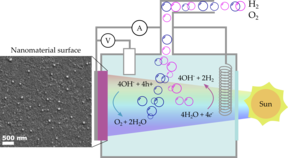Defence of doctoral thesis in the field of Micro- and nanosciences, M.Sc. Camilla Tossi

When
Where
Event language(s)
M.Sc. Camilla Tossi will defend the thesis "Nanomaterials for photoelectrochemical and photocatalytic conversion of solar energy" on 7 May 2021 at 12 in Aalto University School of Electrical Engineering, Department of Electronics and Nanoengineering.
Opponent: Prof. Guido Mul, University of Twente, The Netherlands
Supervisor: Prof. Ilkka Tittonen, Aalto University School of Electrical Engineering, Department of Electronics and Nanoengineering
The public defense will be organized via remote technology. Follow defence: https://aalto.zoom.us/j/67885143891
Zoom Quick Guide: https://www.aalto.fi/en/services/zoom-quick-guide
Thesis available for public display at: https://aaltodoc.aalto.fi/doc_public/eonly/riiputus/
Doctoral theses in the School of Electrical Engineering: https://aaltodoc.aalto.fi/handle/123456789/53
Press release:
One of the main quests of the 21st century is to decrease the carbon footprint of a global population that grows not only in numbers, but also in their resource consumption and in their pollution emission. This challenge can be faced by developing renewable energy sources, and by decreasing the impact of pollutants in the atmosphere and the oceans: solar energy can give a meaningful contribution to both pathways.
Sunlight can be harnessed not only as electricity, from solar panels, but also as chemical energy, from splitting water into oxygen and hydrogen. The process is possible thanks to the electrical charges that photons generate when absorbed by a semiconductor: solar water splitting can be therefore achieved on the surface of photocatalytic and photoelectrochemically active semiconductors, such as GaAs and metal oxides. The generated hydrogen can either be used as fuel, or fed into other chemical, biochemical and biological processes. Additionally, these materials are fit for directly reducing carbon dioxide and decompose pollutant compounds. The real challenge rests in making them durable and efficient enough to have a realistic impact: the materials need to be widely available, the fabrication processes needs to be respectful of the environment, and the produced energy needs to be stored efficiently.
This thesis investigates using nanotechnology in the fabrication and the use of some of these materials: doping the semiconductor and adding thin films or nanoparticles on its surface leads to an increase in the conversion of sunlight to electrical charges, and to an improved transport of charges across the interface between the semiconductor and the water. In particular cases, nanoparticles can be added to the surface by a photochemical process known as photodeposition, that uses non-toxic precursors and exploits sunlight as its main driving force. This process not only fabricates materials for energy harvesting and pollutant degradation, but also does it in a manner that minimizes pollution and uses a renewable source. Uses of these nanomaterials are hydrogen production, pollutant decomposition both from water and from air, and bacterial growth using hydrogen from water splitting and carbon dioxide from air. This is possible for specific bacteria that feed on hydrogen and carbon dioxide, converting them into edible microbial proteins and specialized products, thus combining solar energy, environmental remediation and food production.
Contact information of doctoral candidate:
| camilla.tossi@aalto.fi |






